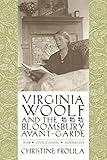Virginia Woolf and the Bloomsbury Avant-garde : War, Civilization, Modernity / Christine Froula.
Material type: TextSeries: Gender and Culture SeriesPublisher: New York, NY : Columbia University Press, [2006]Copyright date: ©2006Description: 1 online resource (432 p.)Content type:
TextSeries: Gender and Culture SeriesPublisher: New York, NY : Columbia University Press, [2006]Copyright date: ©2006Description: 1 online resource (432 p.)Content type: - 9780231134453
- 9780231508780
- Avant-garde (Aesthetics) -- England -- London
- Experimental fiction, English -- History and criticism
- Women and literature -- England -- London -- History -- 20th century
- World War, 1914-1918 -- England -- London -- Literature and the war
- LITERARY CRITICISM / European / English, Irish, Scottish, Welsh
- 823.91209 22
- PR6045.O72 Z6435 2005eb
- online - DeGruyter
- Issued also in print.
| Item type | Current library | Call number | URL | Status | Notes | Barcode | |
|---|---|---|---|---|---|---|---|
 eBook
eBook
|
Biblioteca "Angelicum" Pont. Univ. S.Tommaso d'Aquino Nuvola online | online - DeGruyter (Browse shelf(Opens below)) | Online access | Not for loan (Accesso limitato) | Accesso per gli utenti autorizzati / Access for authorized users | (dgr)9780231508780 |
Frontmatter -- Contents -- List of Abbreviations -- Preface -- 1. Civilization and "my civilisation" -- 2. Rachel's Great War -- 3. The Death of Jacob Flanders -- 4. Mrs. Dalloway's Postwar Elegy -- 5. Picture the World -- 6. A Fin in a Waste of Waters -- 7. The Sexual Life of Women -- 8. St. Virginia's Epistle to an English Gentleman -- 9. The Play in the Sky of the Mind -- Notes -- Index
restricted access online access with authorization star
http://purl.org/coar/access_right/c_16ec
Virginia Woolf and the Bloomsbury Avant-Garde traces the dynamic emergence of Woolf's art and thought against Bloomsbury's public thinking about Europe's future in a period marked by two world wars and rising threats of totalitarianism. Educated informally in her father's library and in Bloomsbury's London extension of Cambridge, Virginia Woolf came of age in the prewar decades, when progressive political and social movements gave hope that Europe "might really be on the brink of becoming civilized," as Leonard Woolf put it. For pacifist Bloomsbury, heir to Europe's unfinished Enlightenment project of human rights, democratic self-governance, and world peace-and, in E. M. Forster's words, "the only genuine movement in English civilization"- the 1914 "civil war" exposed barbarities within Europe: belligerent nationalisms, rapacious racialized economic imperialism, oppressive class and sex/gender systems, a tragic and unnecessary war that mobilized sixty-five million and left thirty-seven million casualties. An avant-garde in the twentieth-century struggle against the violence within European civilization, Bloomsbury and Woolf contributed richly to interwar debates on Europe's future at a moment when democracy's triumph over fascism and communism was by no means assured.Woolf honed her public voice in dialogue with contemporaries in and beyond Bloomsbury- John Maynard Keynes and Roger Fry to Sigmund Freud (published by the Woolfs'Hogarth Press), Bertrand Russell, T. S. Eliot, E. M. Forster, Katherine Mansfield, and many others-and her works embody and illuminate the convergence of aesthetics and politics in post-Enlightenment thought. An ambitious history of her writings in relation to important currents in British intellectual life in the first half of the twentieth century, this book explores Virginia Woolf's narrative journey from her first novel, The Voyage Out, through her last, Between the Acts.
Issued also in print.
Mode of access: Internet via World Wide Web.
In English.
Description based on online resource; title from PDF title page (publisher's Web site, viewed 02. Mrz 2022)


